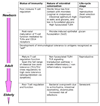Do you have a probiotic in your future?
- PMID: 18762263
- PMCID: PMC2613679
- DOI: 10.1016/j.micinf.2008.07.036
Do you have a probiotic in your future?
Abstract
The possibility of using microbes to maintain health, and to prevent or treat disease is a topic as old as microbiology. However, one factor impeding the introduction of effective probiotics has been our very limited understanding of the composition of the human microbiome, as well as the biological requirements for these organisms. With advances in understanding the microbiome and its metagenome in humans and other mammals, we now can build a more robust scientific basis to develop probiotic strategies. Increasing knowledge of intramicrobial competition and cooperation, as well as host-microbe cross-signaling, will facilitate design of new probiotics and the modeling of their deployment, leading to eventual clinical trials.
Figures
References
-
- Akira S, Takeda K, et al. Toll-like receptors: critical problems linking innate and acquired immunity. Nat Immunol. 2001;2:675–680. - PubMed
-
- Andlid T, Blomberg L, et al. Characterization of Saccharomyces cerevisiae CBS 7764 isolated from rainbow trout intestine. Systematic and Applied Microbiology. 1999;22(1):145–155. - PubMed
-
- Bach JF. Infections and autoimmune diseases. J Autoimmun. 2005;25 Suppl:74–80. - PubMed
-
- Bashir MEH, Andersen P, et al. An enteric helminth infection protects against an allergic response to dietary antigen. J Immunol. 2002;169:3284–3292. - PubMed
-
- Bashir MEH, Louie S, et al. Toll-like receptor 4 signaling by intestinal microbes influences susceptibility to food allergy. J Immunol. 2004;172:6978–6987. - PubMed
Publication types
MeSH terms
Grants and funding
LinkOut - more resources
Full Text Sources
Other Literature Sources
Medical


